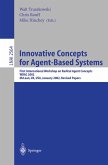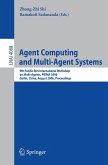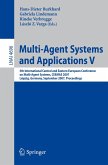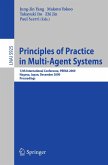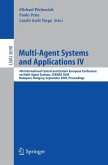Innovative Concepts for Autonomic and Agent-Based Systems (eBook, PDF)
Second International Workshop on Radical Agent Concepts, WRAC 2005, Greenbelt, MD, USA, September 20-22, 2005, Revised Papers
Redaktion: Hinchey, Michael G.; Truszkowski, Walt; Rouff, Christopher A.; Rash, James L.; Rago, Patricia
40,95 €
40,95 €
inkl. MwSt.
Sofort per Download lieferbar

20 °P sammeln
40,95 €
Als Download kaufen

40,95 €
inkl. MwSt.
Sofort per Download lieferbar

20 °P sammeln
Jetzt verschenken
Alle Infos zum eBook verschenken
40,95 €
inkl. MwSt.
Sofort per Download lieferbar
Alle Infos zum eBook verschenken

20 °P sammeln
Innovative Concepts for Autonomic and Agent-Based Systems (eBook, PDF)
Second International Workshop on Radical Agent Concepts, WRAC 2005, Greenbelt, MD, USA, September 20-22, 2005, Revised Papers
Redaktion: Hinchey, Michael G.; Truszkowski, Walt; Rouff, Christopher A.; Rash, James L.; Rago, Patricia
- Format: PDF
- Merkliste
- Auf die Merkliste
- Bewerten Bewerten
- Teilen
- Produkt teilen
- Produkterinnerung
- Produkterinnerung

Bitte loggen Sie sich zunächst in Ihr Kundenkonto ein oder registrieren Sie sich bei
bücher.de, um das eBook-Abo tolino select nutzen zu können.
Hier können Sie sich einloggen
Hier können Sie sich einloggen
Sie sind bereits eingeloggt. Klicken Sie auf 2. tolino select Abo, um fortzufahren.

Bitte loggen Sie sich zunächst in Ihr Kundenkonto ein oder registrieren Sie sich bei bücher.de, um das eBook-Abo tolino select nutzen zu können.
This book constitutes the thoroughly refereed post-proceedings of the Second International Workshop on Radical Agent Concepts, WRAC 2005, held in Greenbelt, MD, USA in September 2005. The 27 full papers presented are fully revised to incorporate reviewers' comments and discussions at the workshop. Topics addressed are social aspects of agents, agent architectures, autonomic systems, agent communities, and agent intelligence.
- Geräte: PC
- ohne Kopierschutz
- eBook Hilfe
- Größe: 6.28MB
Andere Kunden interessierten sich auch für
![Innovative Concepts for Agent-Based Systems (eBook, PDF) Innovative Concepts for Agent-Based Systems (eBook, PDF)]() Innovative Concepts for Agent-Based Systems (eBook, PDF)40,95 €
Innovative Concepts for Agent-Based Systems (eBook, PDF)40,95 €![Agent Computing and Multi-Agent Systems (eBook, PDF) Agent Computing and Multi-Agent Systems (eBook, PDF)]() Agent Computing and Multi-Agent Systems (eBook, PDF)73,95 €
Agent Computing and Multi-Agent Systems (eBook, PDF)73,95 €![Multi-Agent Systems and Applications V (eBook, PDF) Multi-Agent Systems and Applications V (eBook, PDF)]() Multi-Agent Systems and Applications V (eBook, PDF)40,95 €
Multi-Agent Systems and Applications V (eBook, PDF)40,95 €![Engineering Societies in the Agents World VI (eBook, PDF) Engineering Societies in the Agents World VI (eBook, PDF)]() Engineering Societies in the Agents World VI (eBook, PDF)40,95 €
Engineering Societies in the Agents World VI (eBook, PDF)40,95 €![Principles of Practice in Multi-Agent Systems (eBook, PDF) Principles of Practice in Multi-Agent Systems (eBook, PDF)]() Principles of Practice in Multi-Agent Systems (eBook, PDF)73,95 €
Principles of Practice in Multi-Agent Systems (eBook, PDF)73,95 €![Engineering Societies in the Agents World VII (eBook, PDF) Engineering Societies in the Agents World VII (eBook, PDF)]() Engineering Societies in the Agents World VII (eBook, PDF)40,95 €
Engineering Societies in the Agents World VII (eBook, PDF)40,95 €![Multi-Agent Systems and Applications IV (eBook, PDF) Multi-Agent Systems and Applications IV (eBook, PDF)]() Multi-Agent Systems and Applications IV (eBook, PDF)73,95 €
Multi-Agent Systems and Applications IV (eBook, PDF)73,95 €-
-
-
This book constitutes the thoroughly refereed post-proceedings of the Second International Workshop on Radical Agent Concepts, WRAC 2005, held in Greenbelt, MD, USA in September 2005. The 27 full papers presented are fully revised to incorporate reviewers' comments and discussions at the workshop. Topics addressed are social aspects of agents, agent architectures, autonomic systems, agent communities, and agent intelligence.
Dieser Download kann aus rechtlichen Gründen nur mit Rechnungsadresse in A, B, BG, CY, CZ, D, DK, EW, E, FIN, F, GR, HR, H, IRL, I, LT, L, LR, M, NL, PL, P, R, S, SLO, SK ausgeliefert werden.
Produktdetails
- Produktdetails
- Verlag: Springer Berlin Heidelberg
- Seitenzahl: 394
- Erscheinungstermin: 12. Dezember 2006
- Englisch
- ISBN-13: 9783540692669
- Artikelnr.: 44227738
- Verlag: Springer Berlin Heidelberg
- Seitenzahl: 394
- Erscheinungstermin: 12. Dezember 2006
- Englisch
- ISBN-13: 9783540692669
- Artikelnr.: 44227738
- Herstellerkennzeichnung Die Herstellerinformationen sind derzeit nicht verfügbar.
Agent-Mediated Pro-active Web-Sites.- Learning to Use Referrals to Select Satisficing Service Providers.- Towards an Emotional Decision-Making.- A Self-adapting System Generating Intentional Behavior and Emotions.- A New Parameter for Maintaining Consistency in an Agent's Knowledge Base Using Truth Maintenance Systems.- Mind Out of Programmable Matter: Exploring Unified Models of Emergent Autonomy.- Characterizing Environmental Information for Monitoring Agents.- Towards a Model Level Debugger for the Cougaar Model Driven Architecture System.- Can Agent Oriented Software Engineering Be Used to Build MASs Product Lines?.- Towards Dynamic Electronic Institutions: From Agent Coalitions to Agent Institutions.- Institutionalization Through Reciprocal Habitualization and Typification.- On the Concept of Agent in Multi-robot Environment.- An Approach for Autonomy: A Collaborative Communication Framework for Multi-agent Systems.- Autonomy Without Independence: Animal Training as a Model for Robot Design.- Shaping the Future of Online Payment Processing: An Autonomic Approach Applied to Intelligent Payment Brokers.- Genetically Modified Software: Realizing Viable Autonomic Agency.- Harnessing Self-modifying Code for Resilient Software.- Oracle: An Agent-Based, Reference Architecture.- Hierarchies, Holons, and Agent Coordination.- A Systemic Framework for Open Software Agents.- Hybrid System Reachability-Based Analysis of Dynamical Agents.- Distributed Agent Evolution with Dynamic Adaptation to Local Unexpected Scenarios.- Run-Time Agents as a Means of Reconciling Flexibility and Scalability of Services.- Concept and Sensor Network Approach to Computing: The Lexicon Acquisition Component.- An Agent Based Hybrid Analog-Digital Robotic Sensor Web Meta-system.- HarnessingAgent-Based Games Research for Analysis of Collective Agent Behavior in Critical Settings.- Defining Agents Via Strategies: Towards a View of MAS as Games.- Secure Mobile Agent Deployment and Communication Towards Autonomous Semantic Grid.- A System Theory Approach to the Representation of Mobile Digital Controllers Agents.- Towards Adaptive Migration Strategies for Mobile Agents.- Agent Modeling of Tetrahedron-Based Structures.- Congestion Control in Multi-Agent Systems Through Dynamic Games of Deterrence.- Radical Concepts for Self-managing Ubiquitous and Pervasive Computing Environments.- Survivable Security Systems Through Autonomicity.
Agent-Mediated Pro-active Web-Sites.- Learning to Use Referrals to Select Satisficing Service Providers.- Towards an Emotional Decision-Making.- A Self-adapting System Generating Intentional Behavior and Emotions.- A New Parameter for Maintaining Consistency in an Agent's Knowledge Base Using Truth Maintenance Systems.- Mind Out of Programmable Matter: Exploring Unified Models of Emergent Autonomy.- Characterizing Environmental Information for Monitoring Agents.- Towards a Model Level Debugger for the Cougaar Model Driven Architecture System.- Can Agent Oriented Software Engineering Be Used to Build MASs Product Lines?.- Towards Dynamic Electronic Institutions: From Agent Coalitions to Agent Institutions.- Institutionalization Through Reciprocal Habitualization and Typification.- On the Concept of Agent in Multi-robot Environment.- An Approach for Autonomy: A Collaborative Communication Framework for Multi-agent Systems.- Autonomy Without Independence: Animal Training as a Model for Robot Design.- Shaping the Future of Online Payment Processing: An Autonomic Approach Applied to Intelligent Payment Brokers.- Genetically Modified Software: Realizing Viable Autonomic Agency.- Harnessing Self-modifying Code for Resilient Software.- Oracle: An Agent-Based, Reference Architecture.- Hierarchies, Holons, and Agent Coordination.- A Systemic Framework for Open Software Agents.- Hybrid System Reachability-Based Analysis of Dynamical Agents.- Distributed Agent Evolution with Dynamic Adaptation to Local Unexpected Scenarios.- Run-Time Agents as a Means of Reconciling Flexibility and Scalability of Services.- Concept and Sensor Network Approach to Computing: The Lexicon Acquisition Component.- An Agent Based Hybrid Analog-Digital Robotic Sensor Web Meta-system.- HarnessingAgent-Based Games Research for Analysis of Collective Agent Behavior in Critical Settings.- Defining Agents Via Strategies: Towards a View of MAS as Games.- Secure Mobile Agent Deployment and Communication Towards Autonomous Semantic Grid.- A System Theory Approach to the Representation of Mobile Digital Controllers Agents.- Towards Adaptive Migration Strategies for Mobile Agents.- Agent Modeling of Tetrahedron-Based Structures.- Congestion Control in Multi-Agent Systems Through Dynamic Games of Deterrence.- Radical Concepts for Self-managing Ubiquitous and Pervasive Computing Environments.- Survivable Security Systems Through Autonomicity.

